|
|
|
Sort Order |
|
|
|
Items / Page
|
|
|
|
|
|
|
| Srl | Item |
| 1 |
ID:
168483
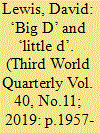

|
|
|
|
|
| Summary/Abstract |
Confusion between the idea of development as purposeful intervention and development as outcome has been addressed by efforts to distinguish ‘intentional’ from ‘immanent’ development, and the distinction between ‘big D’ development as Western post- World War Two modernisation in the Global South, and ‘little d’ as the creation of winners and losers within unfolding capitalist change. As a heuristic device this distinction has been put to a variety of uses within development studies, but it has rarely been subjected to further scrutiny. This paper asks (1) whether the distinction remains coherent or risks being stretched too far, and (2) whether it remains relevant within the changing landscape of twenty-first century development. It first traces the historical evolution of the distinction, and then presents an exploratory case study of Bangladesh’s garment sector in order to analyse the relationship between the two kinds of development empirically, identifying a number of contradictions and ambiguities. It finds that while the ‘D/d’ distinction remains useful at a general level, further conceptualisation is now needed, and its relevance may fade as the significance of Western aid declines.
|
|
|
|
|
|
|
|
|
|
|
|
|
|
|
|
| 2 |
ID:
092045
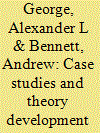

|
|
|
|
|
| Publication |
Cambridge, MIT Press, 2005.
|
| Description |
xv, 331p.
|
| Series |
BCSIA studies in international security
|
| Standard Number |
9780262572224
|
|
|
|
|
|
|
|
|
|
|
|
Copies: C:1/I:0,R:0,Q:0
Circulation
| Accession# | Call# | Current Location | Status | Policy | Location |
| 054574 | 300.722/GEO 054574 | Main | On Shelf | General | |
|
|
|
|
| 3 |
ID:
120192
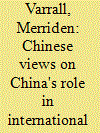

|
|
|
|
|
| Publication |
2013.
|
| Summary/Abstract |
China's increasing role as a provider of overseas aid is the subject of considerable debate both within and outside of China. However, despite research activity examining how Chinese aid is materialised, very little is actually known about why Chinese aid projects are developed or implemented the way they are. Although recent indications suggest the Chinese government is increasingly willing to be more open about overseas aid, for example, the release of the first White Paper on Foreign Aid in 2011, external observers remain largely unaware of the values, goals and motivations behind Chinese aid projects. Alongside this lack of information, non-Chinese analyses tend to be founded on a Realist approach to understanding international relations in which a 'rising power' such as China automatically constitutes a threat to existing power relations. As a result, many scholars conclude that China's aid is part of a strategic quest to further its own geopolitical ends. This paper provides insights into the contentious topic of the drivers behind Chinese overseas development assistance. It finds that Chinese elites in the international development sphere do not share the views prevalent in Western international relations discourse about the international system and China's role within it. This article argues that exploring Chinese development actors' and commentators' conceptions of what development means, along with their views on China's role and obligations within the international system, allows a better understanding of the motivations behind Chinese aid, and a re-examination of some of the misconceptions around Chinese aid as a tool of Chinese geopolitical strategy.
|
|
|
|
|
|
|
|
|
|
|
|
|
|
|
|
| 4 |
ID:
108088
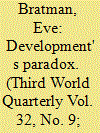

|
|
|
|
|
| Publication |
2011.
|
| Summary/Abstract |
This article examines an urban centre in the heart of the First World through a critical development lens. It contends that traits of the Third World entail certain characteristics which remain consequential as axes of analysis for a variety of economic, political and geographic settings, including new applications in contexts that are typically excluded from the focus of international development practice and scholarship. The article discusses characteristics of 'third worldality' in relation to Washington DC. It posits that, despite being emblematic as a power centre, the city exhibits many of the characteristics of a Third World city. Highlighting disenfranchisement, socioeconomic inequality, and environmental health issues, the article reveals a paradox: underdevelopment in the heart of the 'developed' world. The article calls for greater recognition of the paradoxes of development theory and practice so as to confront persistent problems of orientalism and lack of self-reflexivity in the field of international development.
|
|
|
|
|
|
|
|
|
|
|
|
|
|
|
|
| 5 |
ID:
082010
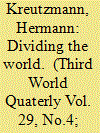

|
|
|
|
|
| Publication |
2008.
|
| Summary/Abstract |
The central themes in development theory have addressed exclusion of social groups, poverty gaps and strategies to overcome development deficits. In order to perceive the spatial structuring of inequality, concepts defining three separate worlds found ubiquitous appreciation and omnipresent adaptation. Coinciding with the end of the Cold War the 'endism' debate also suggested the end of the 'Third World'. Presently it has become apparent that development theories which have ordered global space into three different worlds are experiencing rejuvenated appreciation. Nevertheless, the recourse towards trichotomising the world is not necessarily stimulated by the same concepts as previously. In the era of globalisation and post-developmentalism concepts favouring nation-states as sole reference points have been challenged and criticised, although the debate about failed states has again drawn attention to those entities. The post-9/11 perception of world order, chaos and conflicts has structured the previously acknowledged limitation of resources and the impossibility of catching-up strategies for developing countries in such a manner that 'new' Third World theories point at the exclusion from the developed world of outsiders, by attributing them pre-modern levels of state development and sovereignty. A prominent result of this debate is a perception of ordered space along lines which seemed to have been abandoned some time ago. This paper compares and scrutinises contemporary concepts of dividing the world
|
|
|
|
|
|
|
|
|
|
|
|
|
|
|
|
| 6 |
ID:
116887


|
|
|
|
|
| Publication |
2012.
|
| Summary/Abstract |
Friedrich List's National System of Political Economy continues to be positively received in ipe, where it is treated as a seminal text in development theory. Only a handful of ipe scholars have questioned the specific history of economic ideas through which List asserted the distinctiveness of his own position. They do so by showing that he deliberately put words into the mouths of his classical political economy predecessors to provide himself with something to argue against. His alleged authority on development issues rests in particular on purposefully caricaturing the arguments of Adam Smith. I use this article to suggest a plausible reconstruction of the route to List's Smith, one which recognises the possible intermediary influence of the early Dugald Stewart, John Ramsay McCulloch, the Earl of Lauderdale and Georg Sartorius. By following this complex trail to List's rather eccentric Smith historiography, it becomes possible to break down one of the most important oppositions in ipe pedagogy: that between List's National System and Smith's Wealth of Nations. It also becomes necessary to engage more circumspectly with List's history of economic ideas when searching for the origins of contemporary critically minded development theory.
|
|
|
|
|
|
|
|
|
|
|
|
|
|
|
|
| 7 |
ID:
156654
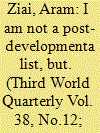

|
|
|
|
|
| Summary/Abstract |
During the course of the 1990s, the Post-Development school emerged as an innovative though controversial approach in development studies. The article examines its critical reception in the textbooks and the extent to which its authors and arguments have become influential. It argues that the relationship between development studies and Post-Development is characterised simultaneously by (sometimes explicit, sometimes implicit) rejection and integration. Examining a number of current development studies textbooks, it illustrates the growing influence of Post-Development arguments and how they have been tacitly or consciously taken up while often rejecting Post-Development per se.
|
|
|
|
|
|
|
|
|
|
|
|
|
|
|
|
| 8 |
ID:
116860
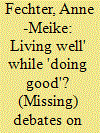

|
|
|
|
|
| Publication |
2012.
|
| Summary/Abstract |
This paper takes at its starting point public criticism of international aid workers who appear to be 'doing well out of poverty'. Based on fieldwork in Cambodia, the paper suggests that such public perceptions are mirrored by some aid workers' uncertainties about the moral dimensions of their own and others' lifestyles. Significantly, analyses of such public and private unease are largely absent from development ethics, even though comparable professions, such as nursing or social work, having produced substantial work on these issues. I argue that the scarcity of equivalent studies in development studies is partly the result of a tendency to foreground the 'other'-the world's poor-while rendering those who deliver aid invisible. Placing 'aid recipients' and 'aid givers' in separate categories, together with an emphasis on collective rather than individual moral responsibilities, not only makes it difficult to conduct open debates on the role of altruism and professionalism among aid workers, but also indicates how practices of 'othering' continue to inform aspects of development theory and practice.
|
|
|
|
|
|
|
|
|
|
|
|
|
|
|
|
| 9 |
ID:
128469
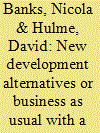

|
|
|
|
|
| Publication |
2014.
|
| Summary/Abstract |
The state, market and civil society constitute the three main institutional domains of the 'development' landscape. Perceptions of these three actors have evolved over time alongside conceptualisations of what constitutes and best promotes 'development'. The array of contributions in this special issue points towards a worrying implication for the transformative potential of development activities and interventions. While the new diversity in actors and alliances brings new opportunities for development, we see the majority placing the responsibility for development in the hands of the state and market. Furthermore, the hollowing out of civil society - apparent from the lack of priority given to it in the Global South and the promotion of development as 'responsible consumerism' in the North - represents a missed opportunity for consolidating the progress made in the commitment to poverty reduction since the UN Millennium Declaration. Reaching greater transformative potential would require focusing as much on inclusive social development as on inclusive economic development. Doing so would tackle the big questions of power and inequality that remain among the root causes of poverty today.
|
|
|
|
|
|
|
|
|
|
|
|
|
|
|
|
| 10 |
ID:
156643
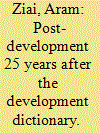

|
|
|
|
|
| Summary/Abstract |
Few books in the history of development studies have had an impact like The Development Dictionary – A Guide to Knowledge as Power, which was edited by Wolfgang Sachs and published by Zed Books in 1992, and which was crucial in establishing what has become known as the Post-Development (PD) school. This special issue is devoted to the legacy of this book and thus to discussing PD.
|
|
|
|
|
|
|
|
|
|
|
|
|
|
|
|
|
|
|
|
|